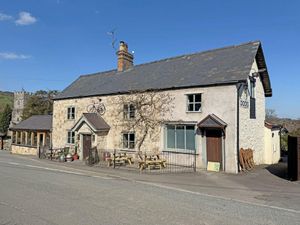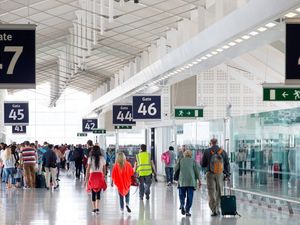Shropshire's pubs adapt to beat recession
There's much talk about the death of the great British pub. But in Shropshire some landlords are fighting back, as Alex James reports.
There's much talk about the death of the great British pub. But in Shropshire some landlords are fighting back, as Alex James reports.
The clock ticks past 2pm on a Tuesday and Chrissy Gough is tucking into a late lunch at her pub, The Fox & Hounds in Cheswardine.
Her partner Mark Wood is behind the bar enthusiastically wishing every customer from a large lunchtime party a good day as they head off.
As I sit down in the newly refurbished lounge area and jealously eye up Chrissy's chunky chips, she tells me the couple have had to diversify to make a success of their pub - with the chips just one change made since they took over the village boozer last September.
Chrissy, who is also a professional dog groomer, said the pub had changed its image to give it a new identity.
"This was purely a drinking pub," she says. "I think it's now back to what people want, which is a family community pub where you can bring your children and your elderly mother and not worry about it.
"We have live entertainment, bingo nights a poker league, darts, dominoes and pool teams.
"If people in the village say there's something they want to do then we will try these things. We had a Caribbean night last month and it was fantastic - we had reggae music and people dressed up in shorts and flip-flops and everyone had a good time.
Shop
"It's a case of you get out what you put in. We have to try everything to make sure we survive and that the village survives."
That is typified by the addition of a new community shop in the pub's old wash house.
Chrissy handed over the keys free of charge to a group of residents who were keen to see their village shop reopened.
She says: "We've done the community a favour by donating the building and the service of the shop, which to some people is invaluable, and it does us a favour because people might come here and have a look at what's going on and maybe pop in."
The couple took over the pub in September and Mr Wood, known universally to locals as Woody, hosts community events such as the annual Fox & Hounds Fun Run day, which takes place on July 25, in aid of local charities.
He says: "Our ethos is to provide a community pub that offers real ales, good food and a warm welcome. If anyone wants anything they can come in here and we will do it because that's what it should be about.
"There's another pub 60 yards down the road and it just provides healthy competition. I think that's the problem now — some villages have five pubs and that just can't be sustained.
"A well-run village pub even in this financial climate will survive, as long as you've got the support of the village and provide them with the services they want then it can work. It's a necessity that we have to do food and that's just the nature of trade today."
The need to serve food has killed off a number of "drinker's pubs", which are no longer able to survive on a diet of die-hards and dominoes.
One such boozer was the Elephant & Castle in Ketley, Telford. For years it was a place populated by locals, it is now an Indian restaurant offering buffet meals at a reasonable prices.
Co-owner Ali Ahmed says the Blue Elephant restaurant has gone from strength to strength since opening last August.
He says: "We have had a lot of favourable comments since we opened and are getting a lot of repeat business.
"We weren't here when it was a pub but I understand it had suffered a drop in its reputation over the past few years.
"But we wanted to come to Telford. I think it's a town on the up and there is great opportunity for businesses."
That change from pub to restaurant has no doubt been partly borne out of increased competition from supermarkets.
In your local Asda you can get 30 bottles of Stella Artois for £15 - in most pubs a pint will set you back about £2.80. It's clear where your wallet would rather you shopped for booze.
But the difference is that a supermarket aisle can't offer a real evening out, where locals can catch up with friends, enjoy a game of poker and have a couple of beers.
That is the offer at the Captain Webb pub in Wellington. From the outside it looks very much a "drinkers' pub" and, in fact, was, but landlord Paul Trott has now started to serve food as well as providing space for regular pub games such as pool and darts and newer ones such as poker.
He says: "We have something on every night, whether it be pool teams or a quiz or bingo night.
"We have to try and get a cross-section of society in and get ourselves involved in the community.
"The supermarkets can sell large volumes of alcohol at low prices and then they have no responsibility over who drinks it, whereas the pub landlord can instantly see who he is dealing with and whether they might have had too much to drink."
He added: "If people had no choice but to buy drink from their local pub then every pub in Great Britain would be doing a lot better."
Shropshire has suffered its fair share of pub closures but the county is finally moving in the right direction.
The days of reporting on the next rural pub that cannot sustain itself or the town centre boozer, which has been priced out of the market by cheap supermarkets, are being replaced by new landlords throwing open the doors and breweries splashing the cash on refurbishments.
Nowhere is this perhaps more evident than the Dorrington Horseshoes, a village pub which is now at the heart of the community thanks to a six figure refurbishment, the addition of five bed and breakfast rooms and the village post office sitting in the front of the building. As I enter before the pub opens for the day, manager James Dawson takes five minutes out of his preparation to chat about how he wants the pub to become synonymous with the village.
He says: "We've rebranded it as Dorrington Horseshoes which sums up how much we want to be part of a community.
"We've also got five bed and breakfast rooms which is something I was keen to do. The target audience for the B&B is business people during the week and long weekenders and then friends and family of people who live in the village because some people haven't got space to put them up."
Mr Dawson, originally from Ludlow, says local people have responded well to the new layout and a new food menu.
He says: "It was always my intention to do food but I didn't do it beforehand because it wasn't feasible with the layout. Everything has changed here. It was in need of a lot of TLC and I couldn't do the quality of food I wanted in that environment.
"But the feedback has been very good - we're doing food seven days a week and it's going very well. "
And in another example of the community being at the forefront of Shropshire landlords' minds — as part of the refurbishment Mr Dawson gave the post office a new, stronger location.
He says: "The post office used to be at the back but we wanted that space for the kitchen so we moved it to the front and it gave it an increased trading area and it's in a much more prominent position in terms of bringing people in."
Popping into the post office trade is certainly brisk with half a dozen customers wandering in and out.
And Julia Kesterton, who runs the post office, said the move to the front of the building, alongside a busy main road, was already paying off, with some passing trade.
It seems a move to 'community pubs' could be one way of sustaining the trade in the wake of traditional 'pie and pint' boozers falling by the wayside.
And if that preserves businesses and jobs, as well as beer and a bit of banter, then we'll all drink to that.
Case study 1: The Aston, Church Aston, Newport
Celebrity investors are dipping into the lucrative Shropshire pub market, amid a belief that the industry is set to enjoy a renaissance. Heart FM DJ Nick Snaith is the new owner of the Aston, formerly known as the Last Inn. It opened this summer and Nick believes there has never been a better time to get behind the bar.
He decided to put his money where his mouth is and invest in the industry's success. Nick says: "I've got a lot of ideas and I want to make it the best pub it can be. I'm really excited about how everything is taking shape and want to make it a success.
"The Last Inn hadn't had the best of reputations over the past few years - I think there had been quite a few changes of landlords there - and that's one the reasons why we re-named it. We want to show that it's a new name for a fresh start.
"We will be doing food and trying to bring it back to proper food served well. We have enough space for a 100 cover restaurant and we've got a really quaint beer garden at the back which has its own bar.
"You have to do food really to be able to survive in this market and we think that is something we can exploit. I think if you can do it well you can still survive at the moment. Most of the pubs in Newport are drinking pubs and the area does do quite well generally so I think we can survive here.
"I think the Last Inn closed last October and we saw an opportunity. It's a really good location and it's something I want to make work."
Nick says a little bit of local knowledge goes a long way in the pub trade.
He adds: "I live in London but I am from this area originally and my parents still live here and will be fixtures behind the bar so we have got local connections.
"I think that helps when you're trying to run a pub - if you can have a bit of local knowledge it really does help make the pub a success.
"We used to have the Swan at Forton."
Case study 2: The Pheasant, Newport
Few regulars last 18 years in the same pub, even fewer landlords stay the cours, but Newport publican Paul Quinn has celebrated his "coming of age" behind the bar at the Pheasant Inn, in the town's High Street, after serving since 1993.He's seen plenty of changes in his time - from the scrapping of a smoking ban, to the advent of the Sky Sports generation to one of the deepest recessions ever to hit the country.
Mr Quinn thinks that moving with the times to create a business model has been the biggest change.
He said: "Running a pub is not just a matter of being able to pull a pint, you've also got to be able to run a business and that's something which people don't see.
"The costs have just gone up so much - they're trying to say the smoking hasn't affected the pubs and it's not so much a problem for me because I have a garden and I have the facilities but there are some village pubs that it's just killed.
"Every time the duty goes up on beer and petrol and cigarettes - the three things which we have dealt with - we are hit.
"I think the industry has been hit hard by the bureaucracy and the rates and things like that. I'm not sure there is more paperwork involved now but people just don't realise that you need to have a lot of business sense as well."
Mr Quinn added that the World Cup had been an important revenue stream for his pub.
He said: "Sport has really taken off and that's something that has changed massively. Do I need Sky Sports? Yes I do because I've built my business on it. There's nothing like a big football or rugby match to get people in.
"Making the pub a home-from-home is what it's all about.
"Eighteen years is a long time to be at the same pub and I think I'm the longest serving landlord in the town by about six years. But I really love it here.
"I've made a lot of friends in the town and have done a lot of work for charity. Every night I probably have some team or another back in here for food and that eventually will come round to help you out.
"You really do have to put everything into the job and then you will see the rewards."



